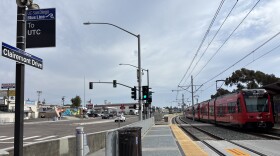Boston police are trying a new weapon in their war on gangs. They're hoping a little old-fashioned public humiliation might help curb inner-city violence. But many fear the new tactic will backfire.
The idea came to police after a cold-blooded murder last month left them grasping for new ideas. Two gang members were accused of gunning down a 14-year-old boy who was playing outside. The two were quickly charged with murder, but Police Commissioner Ed Davis took it a step further, distributing fliers around town with the pictures of 10 others believed to be in the same gang.
"There's no question that anybody who is associated with a gang that is responsible for the execution of a 14-year-old boy should be shamed, and that is what we're hoping for," Davis says.
The commissioner wants the alleged gang members ostracized.
"They live in a society, they have relatives, they have friends, they have people they have to interact with at Thanksgiving," Davis says. "They have to go home. And when they go home, their family should be saying, 'This is wrong.' "
Some, however, find that notion absurd. Gang members clearly play by their own -- very different -- rules of right and wrong. Even Nathaniel Davis, father of the murdered 14-year-old, says it's silly to think that posting gang members' pictures will somehow make them suddenly grow a conscience.
"How would it shame them? These guys are doing stuff in the middle of daylight," he says. "What makes them think if people see a picture that it's going to stop them?"
'Hail Mary' Raises Due-Process Concerns
The Rev. Eugene Rivers, who has been working on violence prevention in Boston for decades, says that when he asks gang members what they think of the policy, all he gets is a laugh. He says they're just as likely to see it as a badge of honor.
"It was an understandable Hail Mary thrown by a commissioner who was frustrated," says Rivers. "A piece of paper is not gonna change anyone. It's desperate."
Bishop Filipe Teixeira, who works with kids in Boston, says the fliers will make those pictured into targets, putting them and others at even greater risk. "You don't shame a brother. ... By shaming me, you make me more angry, more upset and more violent," Teixeira says.
Teixeira says the fliers also raise questions of due process. They look like "wanted" posters. There are no names -- only mug shots -- and instructions to call police with any information about the young men who are "known to associate with criminals and gang members."
But none of the 10 faces an arrest warrant.
"Anytime you have guilt by association as a kind of smear campaign, especially when done by a police department, which has the power of the state behind it, it should raise alarm bells as a matter of civil liberties and fairness," says Carol Rose, head of the Massachusetts Civil Liberties Union.
'When Are They Gonna Take Them Off The Streets?'
Rose says the posters would probably pass legal muster. But defense attorney Lefteris Travayiakis, who says he has represented two of those pictured in the flier, says he believes police are clearly overstepping the boundaries of fairness.
"If you think these kids are bad kids, then arrest them. Put your money where your mouth is. And if you can't do that, I think it's shameful by the Boston Police Department to put this kid's picture all over the Internet, all over the state of Boston, and then say this guy's a bad kid. I mean, what are the police trying to do here?" Travayiakis says.
It's the same question Nathaniel Davis was asking just days after his son was killed. He actually saw one of the young men pictured on the flier and called police to tell them. But the father says police basically told him there was nothing they could do.
"To show their faces, and they're still walking around here. C'mon now, what's the sense of putting them out there if they just want to recognize them? When are they gonna take them off the streets?" Davis asks.
Police say they're hoping the posters will eventually prompt someone to call in with some real evidence of criminal activity. Trouble is, in a city where residents are notoriously reluctant to "snitch," many say posting the faces of young men who are not charged with any crime will not help police build more trust.
Copyright 2022 NPR. To see more, visit https://www.npr.org. 9(MDAzMjM2NDYzMDEyMzc1Njk5NjAxNzY3OQ001))






